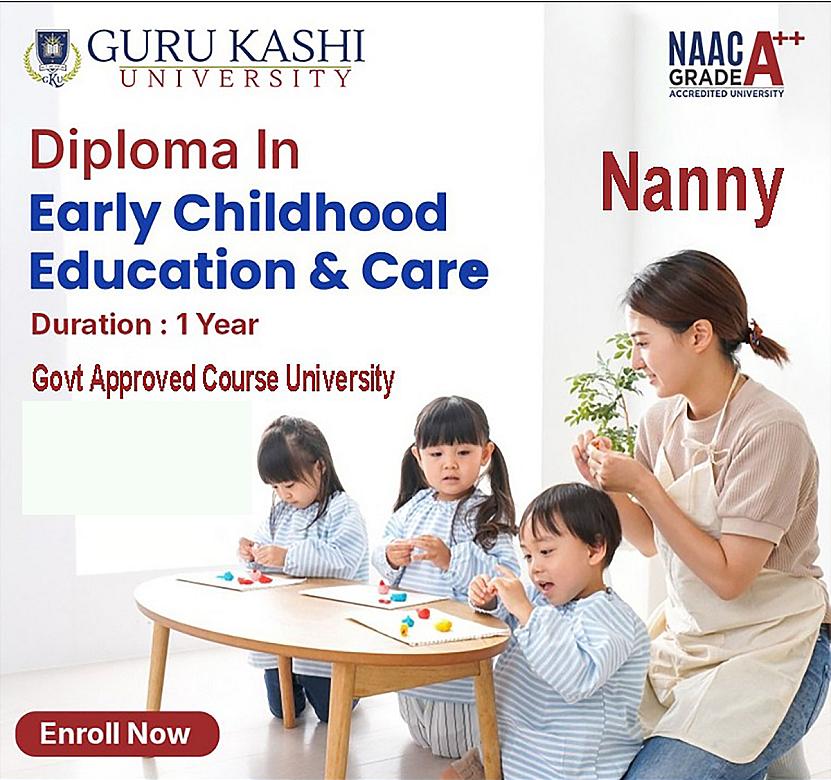DIPLOMA IN ECCE
- 4 months ago 2025-07-26 10:42:17
- NANNY Category
- Review
- 38 /50 Student Users Per Batch

Course Descriptions
The Diploma in Early Childhood Care and Education (ECCE) at ISG is a professionally crafted program designed to prepare educators, caregivers, and early learning specialists for impactful work with children aged 0 to 6 years. Rooted in international best practices and child development theory, the program reflects ISG’s commitment to excellence in global education and inclusive learning.
Course Features
- Comprehensive Curriculum: Covers all essential areas of early childhood education including child psychology, pedagogy, health, nutrition, and classroom management.
- International Standards Aligned: Designed in line with global ECCE frameworks (e.g., NEP 2020, UNESCO ECCE guidelines, and early years frameworks like EYFS or IB PYP).
- Blended Learning Approach: Combines interactive classroom sessions, workshops, and online resources for flexible, engaging learning.
- Play-Based and Experiential Learning: Focus on hands-on, activity-based methods that reflect how children learn best.
- Internship / Practicum Component: Includes real-world teaching experience in preschools or early learning centers under expert supervision.
- Inclusive Education Focus: Trains learners to support children with diverse learning needs and abilities, fostering inclusive classroom environments.
- Multilingual and Multicultural Contexts: Prepares educators to work in diverse settings with children from different linguistic and cultural backgrounds.
- Qualified Faculty and Mentors: Classes led by experienced educators, child psychologists, and ECCE specialists offering academic and field guidance.
- Career Readiness Support: Offers job placement assistance, resume-building workshops, and interview preparation for careers in early childhood education.
- Pathway to Higher Education: Acts as a stepping stone for Bachelor's degrees or advanced certifications in education, psychology, or social work.
Course Scope
- Child Development Foundations: Covers physical, cognitive, emotional, language, and social development of children from birth to 6 years.
- Early Learning Theories and Pedagogies: Explores child-centered, play-based, Montessori, Reggio Emilia, and inquiry-based approaches to early childhood education.
- Curriculum Planning and Classroom Management: Equips learners to design age-appropriate, inclusive, and engaging lesson plans and manage early learning environments.
- Health, Safety, and Nutrition: Focuses on the physical well-being of children, including hygiene practices, child safety, first aid, and balanced nutrition.
- Observation and Assessment Techniques: Introduces tools and methods to observe child behavior and assess developmental progress for early intervention and support.
- Inclusive Education and Special Needs Support: Emphasizes understanding and supporting diverse learning needs, including children with developmental delays or disabilities.
- Language and Communication Development: Supports multilingual and multicultural environments, promoting early literacy and language acquisition through storytelling, songs, and conversation.
- Parent and Community Engagement: Encourages building strong partnerships with families and involving communities in the learning process.
- Professional Ethics and Educator Responsibility: Highlights the importance of ethical practice, confidentiality, and the role of the educator as a role model and lifelong learner.
- P: ractical Training and InternshipsIncludes hands-on training through classroom internships, preschool placements, or supervised fieldwork to develop real-world teaching skills.
- Course fee 1.00
- Course Type Offline
- Duration 1 YEAR
- Skill level Beginer
- Certificate Yes
- Exam Yes
- Max Students 68 / 100
- Language English

-thumb.jpg)

-thumb-thumb.jpg)
-thumb.jpg)
